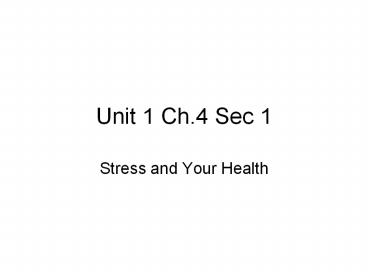Unit 1 Ch.4 Sec 1 - PowerPoint PPT Presentation
1 / 20
Title: Unit 1 Ch.4 Sec 1
1
Unit 1 Ch.4 Sec 1
- Stress and Your Health
2
What Causes Stress?
- Stress- the bodys and minds response to a
demand. - Stress is caused by Stressors.
- Stressor- any situation that puts a demand on the
body or mind. - Environmental- events in your physical
environment. Ex. Pollution,Crowding,Noise - Biological-when its tough for your body to take
part in daily activities. Ex. Having an illness,
disability, or an injury. - Thinking-any types of mental challenges. Ex. Test
and Homework
3
Stressors Cont.
- Behavioral- Unhealthy behavior. Ex. Not getting
enough sleep, alcohol, drugs. - Life Change-Major life change whether or --.
Ex. Death of a loved one, breaking up with a
boyfriend or girlfriend.
4
Fight-or -Flight
- Response your body provides you with the energy,
reflexes, and strength you need to respond to
stressors. - Epinephrine-(Adrenaline) hormone the body
releases in times of stress.
5
Types of Stress
- Eustress- a positive stress that energizes a
person and helps a person reach a goal. Appear
confident and in control. - Distress- negative stress that can make a person
sick or keep a person from reaching a goal. Keep
you from doing your best. - Activity with Chopsticks.
6
Long-Term Stress
- Stress-Related Diseases Tension Headache,
Asthma, Heart Disease, High Blood Pressure,
Insomnia, Weaken Immune System - General Adaptation Syndrome
- 1. Alarm Stage- mind becomes alert.
Fight-or-Flight. Body responds to the demand. - 2. Resistance Stage-if stress continues, body
becomes more resistant. Cope with w/ added stress
for limited time. - 3. Exhaustion Stage-body cant take resistance
to stressor, body becomes exhausted. Organs and
immune system start to suffer.
7
Unit 1 Ch. 4, Sec. 2
- Dealing with Stress
8
Taking Care of Yourself
- Exercise relieve the tension. Tension is when
the muscles are strained. - Rest Get at least 9hrs. of rest. Not getting
enough rest can lead to exhaustion which leads to
illness. - Eat Right eating nutritious foods gives the body
vitamins, minerals, and energy.
9
Build Resiliency
- Resiliency-the ability to recover from illness,
hardship, and other stressors. - Resilient people are optimistic, struggle less
and succeed more. - Asset-a skill or resource that can help a person
reach a goal. (Table pg. 85) Stronger your assets
the stronger a person will feel.
10
Unit 1 Ch. 4, Sec. 3
- Coping With Loss
11
Effects of Loss
- Many forms of loss Death of a family member,
Divorce of Parents, Death of a Pet, Breakup with
a Boyfriend or Girlfriend, Move away from home. - Different Types of Feelings
- Loss Can Cause Stress
12
The Grieving Process
- Grieve-to express sadness b/c of loss.
- Grieving helps you heal from the pain of a loss.
- Grieving Process
- 1. Denial-first reaction. Person refuses to
believe the loss occurred - 2. Anger- normal. Person may blame themselves or
others for a loss. - 3. Bargaining-final attempt at avoiding what is
true. Person makes promises to change if the
person or thing they lost is returned.
13
Grieving Process Cont.
- 4. Depression-Sadness is natural and important to
express. However if being sad all the time keeps
you from daily activities for a period of time,
seek help. - 5. Acceptance-when a person learns how to live
with a loss. Person knows loss will be painful
but will get through it and life will go on.
14
Help for Dealing with Loss
- Get plenty of RR
- Share memories and thoughts
- Express your feelings
- Dont blame others if loss was unintentional
- Helping Others What can you do?
15
Unit 1 Ch. 4, Sec. 4
- Preventing Suicide
16
Facts About Suicide
- Suicide-the act of intentionally taking ones
life. - People who attempt suicide dont really want to
die. - Person feels helpless about how to end their
emotional pain. - 1. People who consider it only do for a brief
period of time - 2. Suicide doesnt happen without warning.
17
Suicide Cont.
- Suicide is the 5th leading cause of death for
ages 25 to 64. - Its the 3rd leading cause of death for people
between 15-24.
18
Warning Signs
- Feeling Hopeless
- Withdrawing from family and friends
- Neglecting basic needs
- Experiencing loss of energy
- Taking more risks
- Using alcohol and drugs
- Giving away personal things
19
Words That Warn
- I wish I were dead.
- I just want to go to sleep and never wake up.
- I wont be a problem for you much longer.
- I cant take it anymore.
- This pain will be over soon.
- Nothing matters.
20
Help
- Take all talk about suicide seriously.
- Tell your friend that suicide isnt the answer.
- Change negative thoughts into positive thoughts
- Dont keep a secret.
- Activity pg. 95































